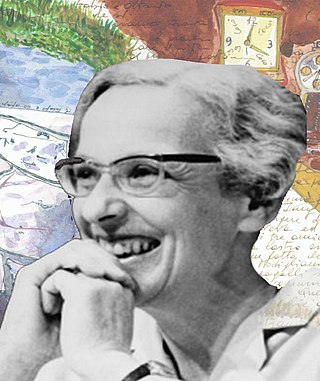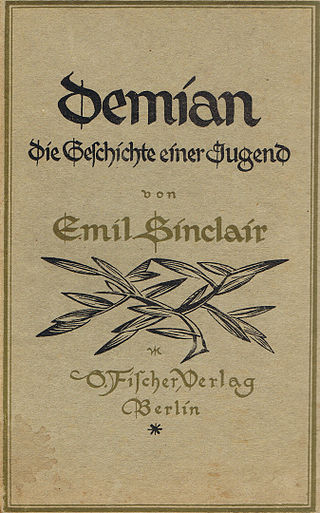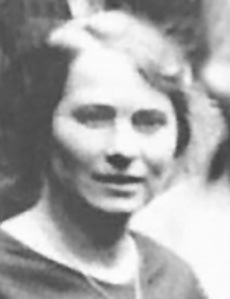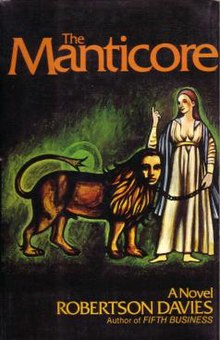
William Robertson Davies was a Canadian novelist, playwright, critic, journalist, and professor. He was one of Canada's best known and most popular authors and one of its most distinguished "men of letters", a term Davies gladly accepted for himself. Davies was the founding Master of Massey College, a graduate residential college associated with the University of Toronto.

Carl Gustav Jung was a Swiss psychiatrist, psychotherapist, psychologist and pioneering evolutionary theorist who founded the school of analytical psychology. He was a prolific author, illustrator, and correspondent, and a complex and controversial character, perhaps best known through his "autobiography" Memories, Dreams, Reflections.
The Deptford Trilogy is a series of inter-related novels by Canadian novelist Robertson Davies.

Gall according to hagiographic tradition was a disciple and one of the traditional twelve companions of Columbanus on his mission from Ireland to the continent. However, he may have originally come from the border region between Lorraine and Alemannia and only met Columbanus at the monastery of Luxeuil in the Vosges. Gall is known as a representative of the Irish monastic tradition. The Abbey of Saint Gall in the city of Saint Gallen, Switzerland was built upon his original hermitage. Deicolus was the elder brother of Gall.

Fifth Business (1970) is a novel by Canadian writer Robertson Davies. First published by Macmillan of Canada in 1970, it is the first installment of Davies' best-known work, the Deptford Trilogy, and explores the life of the narrator, Dunstan Ramsay. It was the novel that brought Davies to international attention.

Analytical psychology is a term coined by Carl Jung, a Swiss psychiatrist, to describe research into his new "empirical science" of the psyche. It was designed to distinguish it from Freud's psychoanalytic theories as their seven-year collaboration on psychoanalysis was drawing to an end between 1912 and 1913. The evolution of his science is contained in his monumental opus, the Collected Works, written over sixty years of his lifetime.
"Bartleby, the Scrivener: A Story of Wall Street" is a short story by the American writer Herman Melville, first serialized anonymously in two parts in the November and December 1853 issues of Putnam's Magazine and reprinted with minor textual alterations in his The Piazza Tales in 1856. In the story, a Wall Street lawyer hires a new clerk who, after an initial bout of hard work, refuses to make copies or do any other task required of him, responding to any request with the words "I would prefer not to."

Marie-Louise von Franz was a Swiss Jungian psychologist and scholar, known for her psychological interpretations of fairy tales and of alchemical manuscripts.

World of Wonders is the third novel in Robertson Davies's Deptford Trilogy.

Demian: The Story of a Boyhood is a bildungsroman by Hermann Hesse, first published in 1919; a prologue was added in 1960. Demian was first published under the pseudonym "Emil Sinclair", the name of the narrator of the story, but Hesse was later revealed to be the author; the tenth edition was the first to bear his name.
The anima and animus are a syzygy of dualistic, Jungian archetypes among the array of other animistic parts within the Self in Jungian psychology, described in analytical psychology and archetypal psychology, under the umbrella of transpersonal psychology. The Jungian parts of the Self are a priori part of the infinite set of archetypes within the collective unconscious. Modern Jungian clinical theory under the analytical/archetypal-psych framework considers a syzygy-without-its-partner to be like yin without yang: countertransference reveals that logos and/or eros are in need of repair through a psychopomp, mediating the identified patient's Self; this theoretical model is similar to positive psychology's understanding of a well-tuned personality through something like a Goldilocks principle.

Sabina Nikolayevna Spielrein was a Russian physician and one of the first female psychoanalysts. She was in succession the patient, then student, then colleague of Carl Gustav Jung, with whom she had an intimate relationship during 1908–1910, as is documented in their correspondence from the time and her diaries. She also met, corresponded, and had a collegial relationship with Sigmund Freud. She worked with and psychoanalysed Swiss developmental psychologist Jean Piaget. She worked as a psychiatrist, psychoanalyst, teacher and paediatrician in Switzerland and Russia. In a thirty-year professional career, she published over 35 papers in three languages, covering psychoanalysis, developmental psychology, psycholinguistics and educational psychology. Among her works in the field of psychoanalysis is the essay titled "Destruction as the Cause of Coming Into Being", written in German in 1912.
Mary Esther Harding (1888–1971) was a British-American Jungian analyst who was the first significant Jungian psychoanalyst in the United States.

Kristine Mann was an American educator and physician, with a particular interest in working women's health. She was an early practitioner of psychoanalysis in North America.

David Copperfield is a two-part BBC television drama adaptation of Charles Dickens's 1850 novel of the same name, written by Adrian Hodges. The first part was shown on Christmas Day 1999 and the second part the following day.
Léopold Szondi March 11, 1893 – January 24, 1986) was a Hungarian psychiatrist and psychoanalyst, psychopathologist and Professor of psychology. Founder of the concept of fate analysis. He is known for the now-discredited psychological tool that bears his name, the Szondi test.
Jungian archetypes are a concept from psychology that refers to a universal, inherited idea, pattern of thought, or image that is present in the collective unconscious of all human beings. The psychic counterpart of instinct, archetypes are thought to be the basis of many of the common themes and symbols that appear in stories, myths, and dreams across different cultures and societies. Some examples of archetypes include those of the mother, the child, the trickster, and the flood, among others. The concept of the collective unconscious was first proposed by Carl Jung, a Swiss psychiatrist and psychoanalyst.

Djinn is a novel by French writer Alain Robbe-Grillet. It was written as a French textbook with California State University, Dominguez Hills professor Yvone Lenard using a process of grammatical progression. Each chapter covers a specific element of French grammar which becomes increasingly difficult over the course of the novel. The first five chapters are written in the present tense from the first person point of view. The sixth chapter is written partially in the third person past and partially in the first person present. The eighth chapter is written in the first person point of view, but the narrator has changed from the masculine Simon Lecoeur to an unknown female narrator.
Robert Joseph Langs was a psychiatrist, psychotherapist, and psychoanalyst. He was the author, co-author, or editor of more than forty books on psychotherapy and human psychology. Over the course of more than fifty years, Langs developed a revised version of psychoanalytic psychotherapy, currently known as the "adaptive paradigm". This is a distinctive model of the mind, and particularly of the mind's unconscious component, significantly different from other forms of psychoanalytic and psychodynamic psychotherapy.

Scholars, including psychoanalysts, have commented that J. R. R. Tolkien's Middle-earth stories about both Bilbo Baggins, protagonist of The Hobbit, and Frodo Baggins, protagonist of The Lord of the Rings, constitute psychological journeys. Bilbo returns from his journey to help recover the Dwarves' treasure from Smaug the dragon's lair in the Lonely Mountain changed, but wiser and more experienced. Frodo returns from his journey to destroy the One Ring in the fires of Mount Doom scarred by multiple weapons, and is unable to settle back into the normal life of his home, the Shire.












